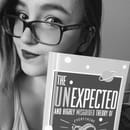You have a cup of coffee in your hands, a beautiful laptop, and the type of determination that arrives only in rare glimpses of a student’s life. So, you open a blank page, stretch out your fingers, ready for the masterpiece that is sure to be derived from this newfound inspiration and… nothing. You stare blankly at your empty document, drumming your fingers against the keyboard. Perhaps you had a clear idea before you opened this document, perhaps your idea is persistent, but you have no clue how to turn it into words. Regardless: you have writer’s block.
It happens to everyone who needs to write for an extensive amount of time, whether it be creatively, academically, or work-related, and yet every single time, it feels debilitating. Fear not, however, because there are a number of ways to heal this pesky disease and I am here to deliver this wisdom onto you in the only acceptable format of internet advice–a short list. Here are three surefire ways to get rid of your writer’s block.
1. Research, Research, Research!
“If you steal from one author it’s plagiarism; if you steal from many it’s research.” – Wilson Mizner
It may not be the most glamorous aspect of writing, but it makes all the difference in the world. It’s fairly straightforward to know where to start researching if you’re writing a non-fiction piece, and if you’ve already done a certain amount of research, you may feel like this doesn’t apply to you; however, it might be worth exploring a different angle. If you’re writing an essay on a piece of art, for example, you might want to research it through the lens of a specific aesthetic or social theory that you hadn’t thought of before. Examples of this may include Feminist Theory, Queer Theory, Critical Race Theory, etc. The point is, by re-framing your work in a different angle, it suddenly becomes fresh and new.
If, on the other hand, you’re working on a creative piece, researching places, myths, cultures, psychology, and anything else that might impact your story can help add depth and realism to your piece, as well as give you new and inspiring ideas that could push you out of your writer’s block. Be careful with this one though, as it has a flip side: do not fall so deep into research that you procrastinate writing your piece. It’s all about balance, and the next trick is exactly what you need to avoid falling into this trap.
2. Deadlines are a Writer’s Best Friend
“I love deadlines. I love the whooshing noise they make as they go by.” – Douglas Adams
Especially to a student, deadlines feel about as appealing as an aging fish casserole, but unlike the latter, they shouldn’t make you sick; in fact, they’re quite healthy when it comes to defeating writer’s block. No artist has ever claimed to be punctual, and most of the academics I know hate it with passion, but it’s hard to argue with results. As everyone who’s ever waited until the very last minute to hand in an assignment knows, there is nothing quite like the level of concentration acquired at eleven thirty five PM on the day that an assignment is due.
It works the same way with personal projects, all you need to do is announce a date by which time you will be finished to some kind of public that will keep you accountable. Writing it down for yourself won’t help for the exact same reason that you have never in your entire life kept a New Years resolution: you have no self control, and you will cheat yourself. Involving other people is the best way to keep yourself on track and make sure that you start what you finish. This can be incredibly stressful however, which leads me to point number three.
3. When All Else Fails: Be a Coward
“Courage is often lack of insight, whereas cowardice in many cases is based on good information.” – Peter Ustinov
You read me correctly. If you have researched until your heart stopped, if you have set yourself a deadline, if you have racked your brain for every scrap of creativity and still find yourself facing a blank page: run. Give up. Give in to your every negative impulse. Why? Because the secret of writer’s block is that it is just as often caused by overthinking as it is by under-preparedness. If you have everything at your disposal to create your piece, but still can’t find yourself able to even start, you need to get out of your head. This means closing your page, taking a breath, going on a walk, watching a movie, spending time on social media, making a meal, reading a book, whatever it is that helps you take your mind off the world around you: do it. By taking a step back, you’ll be able to return at a later date with a clear mind better able to reach your deadline.
So, stop procrastinating by reading long-winded articles about writer’s block, and go work on your project, whatever it might be. Set a deadline, research the hell out of it, but most importantly relax: you’ll get there.



